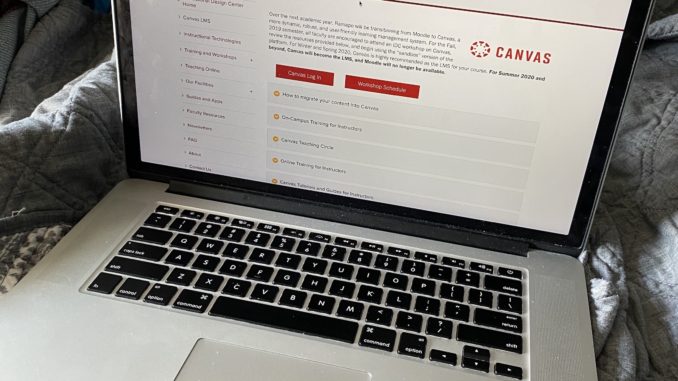
By AMANDA KARP
Kyle Bandilla’s biggest concern before the Covid-19 pandemic was finding a career after he graduated in May.
The Ramapo College senior was focused on preparation, concerned about his ongoing responsibilities at school and how his time as co-president of Ramapo’s radio station, WRPR, was coming to an end.
Now, as a music production major, Bandilla’s biggest concerns are more of the same, but in a broader context.
“It’s going to be a rough path forward with the major that I chose,” said Bandilla of Middletown. “It’s really devastating. I had some career prospects in the works coming into this summer looking to do an internship with live audio, but obviously, live events right now are … not a possibility, and are dangerous.”
Bandilla is eager to return to normal life; whatever that will mean in the coming weeks and months as New Jersey, with more than 138,000 cases and 9,000 deaths, tries to contain the number of people who tested positive for the novel coronavirus.
Gatherings larger than 10 people have been temporarily banned and people must remain at least six feet apart from each other, according to Gov. Phil Murphy’s executive orders 104 and 107. In-person instruction has been halted across all levels of education.
For New Jersey college students, this disruption is deeply felt. Many struggle to adapt to online learning, whether they lived on campus or commuted, to reconcile with the idea of how they thought the rest of their freshman year or final months at college were supposed to go.
A study from Brandeis University set to be completed in May is following 150 students from the university to analyze their stress levels and other behaviors from the disruption they’ve experienced from the pandemic.
Approximately 1 in 5 college students have reported that their mental health has “significantly worsened” because of the pandemic, according to an April 2020 survey by Active Minds. Still, 69 percent of college students, out of more than 3,200 surveyed, are hopeful for the future.
But what their lives look like now is much different.
There’s more time spent on the couch in pajamas, social distancing, using FaceTime and other video chatting apps to stay in touch with friends and family, but there’s more frustration that exists from having their lives interrupted.
College students around New Jersey reflect on what has challenged them during this time, how they’re coping and what comes next.

Kyle Bandilla
Kyle Bandilla’s parents tested positive for the coronavirus after he returned home for spring break, so he and his sister had to quarantine themselves for two weeks.
They’ve since fully recovered from what seemed to be a mild case, and Bandilla thinks he contracted the coronavirus from them. But since he’s younger, Bandilla found he was able to recover more quickly.
“I never got tested, I only had a slight fever for a day,” said Bandilla, 22. “So my symptoms went away fairly quickly.”
But his parents dealt with fevers for a number of days, so Bandilla and his sister “followed strict social distancing” from each other within their home.
“It was tough having to avoid each other like the plague, quite literally,” said Bandilla. “We had to really take precautions in terms of who was touching what, what needs to be disinfected, we took shifts in terms of eating.”
Still, Bandilla considers himself lucky to not have been in a situation where his parents’ lives were threatened or they had to be separated even further.
“It was definitely rough, it was lonely, it was sometimes pretty cold to have to see my mom and avoid her,” said Bandilla. “It was tough but we remained smart, we remained hopeful and nowadays, none of us are [sick]; we’re all doing okay and can be together.”

Matilda Marks
As a commuter, psychology major Matilda “Tilly” Marks is used to working at home, but with five other siblings now at home all of the time, she struggles with staying focused. The living room couch has become her workspace.
“It’s not a closed-off space and leads to every other room,” said Marks, 21, a junior at Georgian Court University in New Jersey. “So I constantly have someone around me to possibly distract me.”
To top it off, she doesn’t like online learning. One of the courses that challenges her the most is her research methods and statistics for psychology majors.
“I don’t like being babied through things,” said Marks. She likes how all the work is given at once, but at the same time: “I don’t have any motivation to do it because there’s no pressure and I’m definitely not learning anything.”
There’s no reason to study or memorize any information that’s on a test since it’s simultaneously available. Her motivation is already low because summer is right around the corner.
“You don’t have that schedule anymore, either,” said Marks. “I’m just waking up whenever and staying in pajamas; everything’s due at midnight so I can do it whenever I want.”
Marks had a paper due that she had forgotten to include something and gotten a couple points off, and wonders if she would’ve still missed it if she wasn’t in such a funk.
“You have some days when you’re so frustrated,” said Marks. “You get frustrated with one of your siblings or you’re really sick of being in the house.”
Take a look at her everyday routine.

Caroline Costello
Caroline Costello, 19, planned to participate in an international volunteer program over the summer to teach English in Poland, but it has since been canceled.
“International travel doesn’t really exist right now,” Costello said of her university’s study abroad options.
She, like many others, is stuck at home for the foreseeable future, waiting out the peak of Covid-19 cases.
She is a sophomore studying political science and international affairs at George Washington University in Washington D.C., and was forced to leave abruptly, with most of her belongings still at school.
“The school is just packing it all into a warehouse for everybody because they won’t let us come back,” said Costello.
Since she’s been at home, Costello tries to have a “fairly regular” schedule “just to keep myself sane.”
Some of her classes are pre-recorded, so students can watch at any time and Costello takes advantage of that to retain a sense of normalcy.
“I try to watch those when the class time would be, just to keep myself in sort of a routine,” she said. She focuses on schoolwork for most of the day to have something to do.
Right now, she’s applying to remote summer internships in order to keep busy.
“I’m trying to find responsibilities outside of when the semester ends, I’ll have nothing to do and that’s very scary,” Costello said. “That’s when I’ll start to lose it.”

Aidan Moyer
Before the outbreak, Aidan Moyer’s favorite pastimes included going to Manhattan and killing time, exploring the different areas of Brooklyn.
“I stopped doing that right when the murmurs about the virus were getting a little bit worse,” said Moyer, 20, a critical and visual studies major at Pratt Institute. He began avoiding taking public transport, making an effort to only attend classes and go about his regular activities.
When two professors told him that they were switching to online instruction, Moyer knew it meant he was going home.
“It’s definitely a challenge to adjust to an at-home environment that I kind of associate with childhood and elementary, middle and high school,” said Moyer, a resident of central New Jersey. “It feels weird superimposing the work and the mindset that I have on a campus in Brooklyn to my childhood bedroom in New Jersey.”
Here’s what their makeshift workspaces look like:
It’s harder for Moyer to balance a similar amount of schoolwork with the distractions and other trials that being at home offer.
“It’s been an adjustment to work here,” said Moyer. “When this was brewing, I knew it was going to be kind of an unpleasant thing for me. Living on my own has been really nice for my mental health, and to not be able to do that right now is less than ideal.”
He misses the liveliness of the city, when it’s in its regular glory, said Moyer.
“God willing, I can’t wait to go back,” said Moyer. “I’m just stuck in the suburbs, trying to ride it out.”

Aimet Salinas
Before the coronavirus outbreak, Aimet Salinas was studying criminology at the University of New Mexico, now she’s studying it at home.
Between finishing up her freshman year online and working, Aimet Salinas hasn’t had much time to relax. She has two jobs, one at Express and the other at Domino’s, but Express has furloughed their employees.
“We don’t work at Express at the moment because they closed down,” said Salinas, 19, of Belmar. “But I work at [Domino’s], so I have to go out all the time and talk to customers, and it’s kind of scary.”
She liked her job at Express more because it was more relaxing and wasn’t always busy, unlike Domino’s. Now, Domino’s is the one pizza place that’s open, and “everyone knows, so it’s always really busy and kind of chaotic.”
It’s hard for Salinas to balance school and work, as most of her shifts are at night.
“[My shifts] go really late, and by the time I get home, I’ll be so tired I don’t want to do work,” she said. “It’s hard; I have to decide what to do and what not to do.”
Usually, Salinas is very motivated to finish her assignments, but now that she’s off-campus, she feels like schoolwork is optional; it’s easier to ignore an email, especially when people aren’t meeting face to face.

Mikayla Yuen
Right now, Mikayla Yuen’s biggest concerns are working, going to the supermarket and running other basic errands.
“Going out in public freaks me out a little bit,” said Yuen, 21, a business economics major at Rutgers University-New Brunswick. “You don’t know these people, what they touch or where they’ve been.”
Originally from Marlboro, she works twice a week at Playa Bowls, where the shifts have been extended to make up for only two people being allowed to work at a time.
“We’ve always been wearing gloves, so that isn’t really an issue,” said Yuen of the new safety protocols enforced by Gov. Murphy, which now requires restaurant workers to wear masks.
Interacting with customers can be “kind of annoying” because they’ll have certain requests, if she can drop orders outside the door, but “we don’t physically leave our store to give them bowls.”
She chose to keep working in order to pay for food and internet, among other bills.
“In the beginning, I wasn’t that scared of this epidemic, so I was like, ‘Yeah, I’ll just keep working,’” said Yuen. “I’m taking a lot more precautions, now that we have to wear masks, it makes me feel better and safer.”

Alika Saxena
Alika Saxena’s entire social life has been built around New York City.
“And now it’s gone,” said Saxena, 19, a freshman majoring in communications and culture at Fordham University.
“The whole college freshman experience … it was supposed to be the best part of [our] year and our first time experiencing college in the spring and ending the year with everybody,” said Saxena. “So I feel like we missed out on a token college experience.”
When the Tenafly native first heard orders about social distancing, she didn’t think it would last for as long as it has. She, like many others, thought she would return to school at the end of March or early April.
Saxena is focusing on herself and school, she doesn’t want to lose touch with reality. It’s easier since her sister has also returned from New York City, where she permanently resides.
“But as more times goes on, it’s going to be hard not seeing my friends, not seeing my boyfriend,” said Saxena. “The only friend I’ve seen, I ran into her on a walk and we talked from 10 feet away.”
She keeps in touch with her friends through group chats, the occasional FaceTime and social media.
Saxena tries to keep herself occupied, whether it’s completing her online classes, binge-watching tv, engaging her creativity or online shopping.
“You’d think it’d be the worst time to do it,” said Saxena. “But there’s something about it that gives me hope or gets me excited, like ‘This is something for when I get out.’”
“I spend my days preparing to leave and preparing for this to be done,” she said.
This is a really compelling story especially since it gave me more of an insiders’ look at how college students around New Jersey have adapted to social distance learning and their families that have been affected that contracted the virus. Reporting and sources are spot on! Media elements supplement the story well. I also really liked the interactive storymap that allowed me to have a geographic lense of where this was happening around the state. What I would learn about is maybe following up with the students to see how they are doing for finishing off their semester or college career and see what their opinions are for what their individual futures hold. Otherwise, great job and well done! 🙂